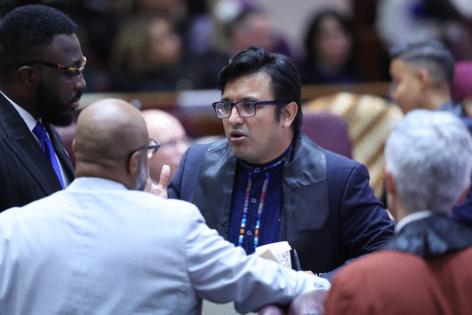Aldermen to lobby lawmakers on behalf of Chicago Mayor Brandon Johnson for 'progressive revenue'
Published in News & Features
CHICAGO — Mayor Brandon Johnson’s Springfield lobbyist plans to lead a group of the mayor’s City Council allies to lobby the Illinois General Assembly on Tuesday for a corporate income tax hike and other long-shot demands for new revenue.
The proposals entail raising the corporate tax rate by 0.92%, imposing a new levy on digital ads and hiking the Personal Property Replacement Tax rate on corporations, according to a “Progressive Revenue Agenda” memo obtained by the Tribune.
Sources said the day of lobbying, organized by Johnson’s head lobbyist in the statehouse, former Ald. John Arena, will include meetings with Illinois House Speaker Chris Welch and Senate President Don Harmon as the legislative body begins the second and final week of its fall veto session. Arena’s agenda does not include a meeting with Gov. JB Pritzker.
Spokespeople for Pritzker didn’t immediately respond to a request for comment on Monday, though the governor recently said he wants the Chicago-area transportation fiscal cliff and reform packages to be settled this week.
In addition to high-stakes negotiations over the transit budget and potential changes to how train and bus service is administered in the Chicago area, lawmakers are focusing during the veto session on electricity rates and insurance regulation.
Johnson, who has hardly anything to show for prior trips to lobby state lawmakers, will not go to Springfield himself this time. Spokesman Cassio Mendoza said that is due to a scheduling conflict. And Mendoza acknowledged there is a very slim chance lawmakers will move the mayor’s extensive wish list across the finish line before adjourning until next year, saying the meetings this week are intended to “start the conversation now, with an eye toward the spring” session.
The council group meeting with the legislative leaders Tuesday will include Aldermen Byron Sigcho-Lopez, Walter “Red” Burnett, Jeanette Taylor and Daniel La Spata, they confirmed Monday. Johnson is not counting on anything on his Springfield agenda to raise money in order to balance the 2026 city budget he’s currently negotiating with the council.
Besides the three revenue proposals, Mendoza said, Johnson’s team also plans to discuss the competing Chicago-area transit packages and increasing local public education spending via state-mandated categorical funding for special education and other school programs.
The memo, prepared by Johnson’s intergovernmental affairs team, seeks to tie the urgency of Johnson’s demands to President Donald Trump’s federal funding cuts and tax breaks, fitting with the mayor’s latest messaging as he heads into exceptionally trying budget negotiations.
“Illinois and Chicago are facing unprecedented fiscal challenges,” Johnson’s IGA memo says. “The General Assembly can lead the way with solutions to address these increasing fiscal challenges impacting working families across the State. The ultra-rich and large corporations can afford to begin contributing their support to Chicago and the State to maintain critical programs our residents rely on.”
The freshman mayor has struggled with shoring up support for his Springfield agenda, and the state has been contending with its own financial issues. Pritzker, who has significant influence over the Democratic supermajority in the General Assembly, last week came out in full-throated opposition to Johnson’s bid to reinstate a $21-per-employee “head tax” on larger businesses to help balance the city budget.
The mayor later that day shot back with another attempt to tie his stalled tax-the-rich agenda to fighting back against Trump: “The President of the United States of America has declared war on the city of Chicago, and I know that the governor is committed to making sure that we are protecting the most vulnerable.”
His closest ally, the Chicago Teachers Union, went on the offensive and shared memes on X with the caption, “JB said no to taxing billionaires… while eating lunch with billionaires. You can’t make this up.”
Still, Arena’s memo described the effort as helping to “further the agenda of building relationships with our state partners.” Some of the programs he cited that will be affected by Trump cuts are not part of the city’s budget, however, such as food stamps and health care benefits.
Arena’s memo says the Springfield proposals would raise $830 million statewide and $75 million to $100 million for Chicago by raising the corporate tax rate, which is 9.5%, to 10.42%.
Another estimated $816 million in revenue would be generated by levying a tax on digital services such as advertising to fund transit, schools or local governments. The levy, applied to any digital ad revenue earned from Illinois viewers, would have a “progressive rate structure (2.5%-10%) application to firms with over $100 million in global revenue.”
That tax would take about two years for full implementation, the memo anticipates.
Meanwhile, the Personal Property Replacement Tax, a levy the state collects from corporations and distributes to local governments, would bring its rate for partnerships, trusts and S-corporations up from 1.5% to 2.5%, generating an estimated $90 million to $100 million for Chicago, the memo says. The maximum deductions allowed for that class of businesses would also be capped at $100,000, rather than the current $500,000, before that option sunsets entirely in 2026.
_____
©2025 Chicago Tribune. Visit chicagotribune.com. Distributed by Tribune Content Agency, LLC.







Comments